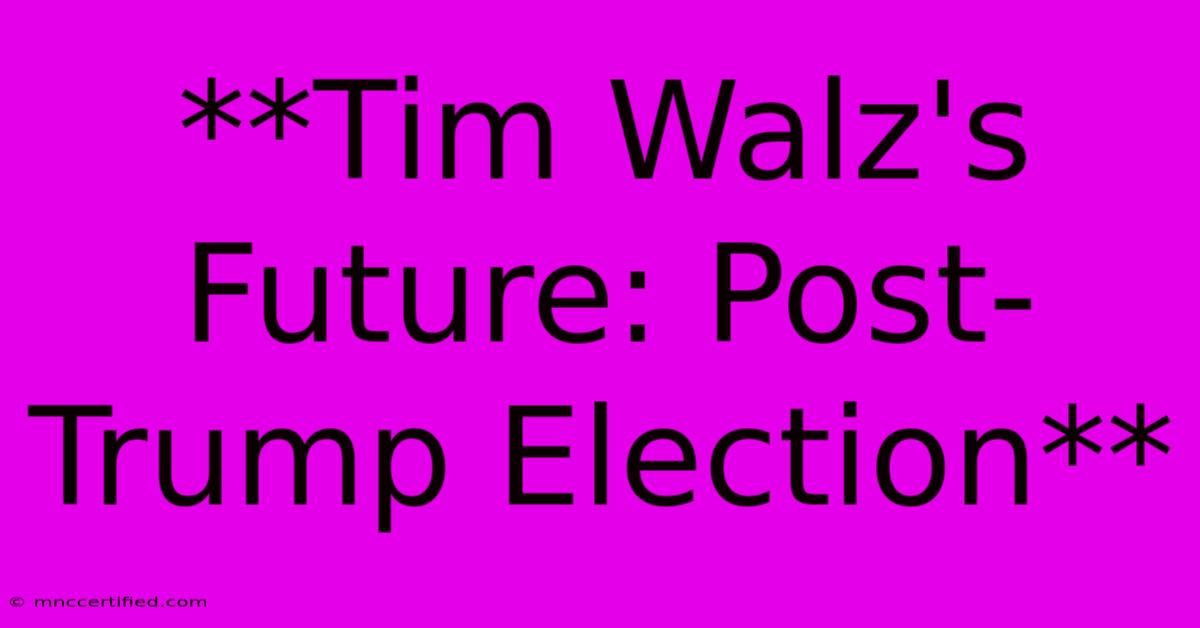**Tim Walz's Future: Post-Trump Election**

Table of Contents
Tim Walz's Future: Navigating Post-Trump Minnesota
The 2020 election brought significant shifts in American politics, with reverberations felt throughout the states. Minnesota, often seen as a bellwether for national trends, experienced its own unique political landscape in the wake of the Trump era. For Governor Tim Walz, re-elected in a tight race against Republican challenger Scott Jensen, the post-Trump era presents both opportunities and challenges.
Re-Election and the Political Landscape
Walz's victory in 2020, though narrow, signaled a continued Democratic hold on the governor's office. This was particularly noteworthy given the national Republican wave that swept many other states. However, the razor-thin margin of victory highlighted the deeply divided political climate in Minnesota. The election underscored the ongoing tension between urban and rural Minnesota, with Walz's strong performance in the Twin Cities contrasting with Jensen's success in more conservative areas.
Navigating the Political Divide
As governor, Walz faces the challenge of governing a state with significant political polarization. His re-election victory did not translate into a clear Democratic majority in the state legislature, requiring him to negotiate and compromise with Republicans to achieve policy goals. This necessitates building bridges across the aisle, a challenging endeavor given the partisan rancor that often dominates state politics.
Key Issues Facing Minnesota
The post-Trump era in Minnesota is defined by a number of pressing issues:
- Economic Recovery: The COVID-19 pandemic significantly impacted Minnesota's economy, requiring Walz to navigate complex economic recovery strategies. Issues like unemployment, business recovery, and infrastructure development are central to his agenda.
- Education and Healthcare: Minnesota has a long tradition of strong public education and healthcare systems, but these institutions face challenges like funding disparities and access issues. Walz must balance the needs of urban and rural areas while addressing these ongoing concerns.
- Social Justice and Racial Equality: The Black Lives Matter movement and the ongoing fight against racial injustice have placed social justice at the forefront of Minnesota's political discourse. Walz faces calls for reform in areas like policing, criminal justice, and education.
The Road Ahead
The post-Trump era in Minnesota presents both opportunities and challenges for Governor Walz. His ability to navigate the political divide, address key issues, and build consensus across ideological lines will be crucial for his success. The 2020 election offered a glimpse into the complex political landscape of Minnesota, and the coming years will provide a test for Walz's leadership and ability to unite a state with diverse perspectives.
Keywords: Tim Walz, Minnesota, post-Trump, election, governor, politics, political landscape, economic recovery, education, healthcare, social justice, racial equality, challenges, opportunities, leadership, divide, bipartisan, consensus

Thank you for visiting our website wich cover about **Tim Walz's Future: Post-Trump Election** . We hope the information provided has been useful to you. Feel free to contact us if you have any questions or need further assistance. See you next time and dont miss to bookmark.
Featured Posts
-
West Indies Bowl In Decider Squad Changes
Nov 07, 2024
-
3m Bondo 261 Lightweight Car Body Filler
Nov 07, 2024
-
Market Performance Nov 6 2024 Dow S And P Nasdaq
Nov 07, 2024
-
Will Insurance Pay More Than Policy Limits
Nov 07, 2024
-
How Much Does It Cost To Make A Meme Coin
Nov 07, 2024